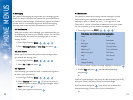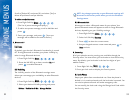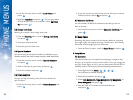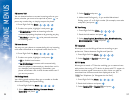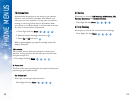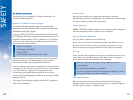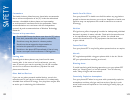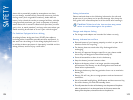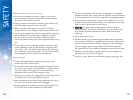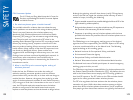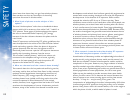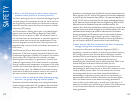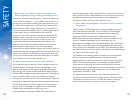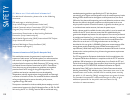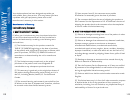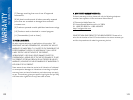
S AFETY
116 117
12. Where can I find additional information?
For additional information, please refer to the following
resources:
FDA web page on wireless phones
(http://www.fda.gov/cdrh/phones/index.html)
Federal Communications Commission (FCC) RF Safety
Program (http://www.fcc.gov/oet/rf safety)
International Commission on Non-lonizing Radiation
Protection (http://www.icnirp.de)
World Health Organization (WHO) International EMF Project
(http://www.who.int/emf)
National Radiological Protection Board (UK)
(http://www.nrpb.org.uk/)
Consumer Information on SAR (Specific Absorption Rate)
This model phone meets the government's requirements for
exposure to radio waves. Your wireless phone is a radio transmitter
and receiver. It is designed and manufactured not to exceed the
emission limits for exposure to Radio Frequency (RF) energy set by
the Federal Communications Commission of the U.S. Government.
These limits are part of comprehensive guidelines and establish
permitted levels of RF energy for the general population. The
guidelines are based on standards that were developed by
independent scientific organizations through periodic and thorough
evaluation of scientific studies. The standards include a substantial
safety margin designed to assure the safety of all persons,
regardless of age and health.
The exposure standard for wireless mobile phones employs a unit of
measurement known as the Specific Absorption Rate, or SAR. The SAR
limit set by the FCC is 1.6 W/kg. Tests for SAR are conducted using
standard operating positions specified by the FCC with the phone
transmitting at its highest certified power level in all tested frequency bands.
Although SAR is determined at the highest certified power level, the actual
SAR level of the phone while operating can be well below the maximum value.
Because the phone is designed to operate at multiple power levels to use
only the power required to reach the network, in general, the closer you are
to a wireless base station antenna, the lower the power output.
Before a phone model is available for sale to the public, it must be tested and
certified to the FCC that it does not exceed the limit established by the
government-adopted requirement for safe exposure. The tests are performed
in positions and locations (e.g., at the ear and worn on the body) as required
by the FCC for each model estimated SAR value for this model phone when
tested for use at the ear is 1.23 W/kg and when worn on the body, as
described in this user guide, is 0.848W/kg (body-worn measurements differ
among phone models, depending upon available accessories and FCC
requirements). While there may be differences between SAR levels of various
phones and at various positions, they all meet the government requirement
for safe exposure.
The FCC has granted an Equipment Authorization for this model phone with
all reported SAR levels evaluated as in compliance with the FCC RF emission
guidelines. SAR information on this model phone is on file with the FCC and
can be found under the Display Grant section of http://www.fcc.gov/oet/fccid
after searching on FCC ID BEJLX350. Additional information on Specific
Absorption Rates (SAR) can be found on the Cellular Telecommunications
Industry Association (CTIA) website at http://www.wow-com.com. In the
United States and Canada, the SAR limit for mobile phone used by
the public is 1.6 watts/kg (W/kg) averaged over one gram of tissue.
The standard incorporates a substantial margin of safety to give
additional protection for the public and to account for any
variations in measurements.



